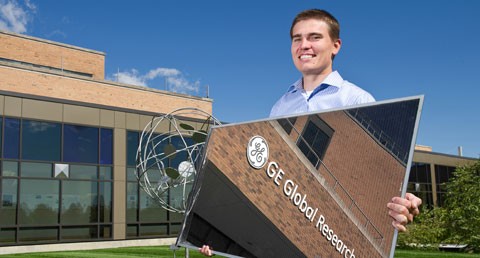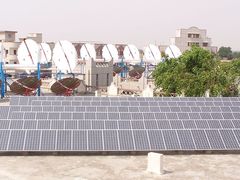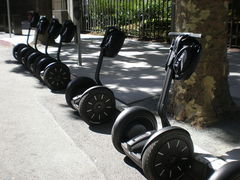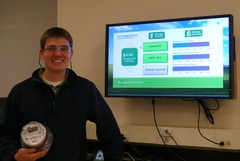
Name Owen Schelenz
- Education M.S. in Electrical Engineering, B.S. in Electrical Engineering
- Target Audience Undergraduate

Electricity. It's not a new concept, and it is something most all of us take for granted. Now, electrical engineers like Owen Schelenz are striving to incorporate renewable energy into our power system so the lights never go out. Read on to discover why being an electrical engineer is such a cool job!
 I work as an electrical engineer in a group called the Power Systems Group at the General Electric (GE) Global Research Center. At GE I focus on the many facets of the technology used to better US and Global Power systems as a whole. I work on the control and stability of the wider area power system and try to integrate more renewable energy into the power system in a responsible manner. We are constantly trying to figure out how to get more wind and solar power on the grid in a manner which won't disrupt the power system - we don't want the power to come and go as the wind blows or as the sun shines.
I work as an electrical engineer in a group called the Power Systems Group at the General Electric (GE) Global Research Center. At GE I focus on the many facets of the technology used to better US and Global Power systems as a whole. I work on the control and stability of the wider area power system and try to integrate more renewable energy into the power system in a responsible manner. We are constantly trying to figure out how to get more wind and solar power on the grid in a manner which won't disrupt the power system - we don't want the power to come and go as the wind blows or as the sun shines.
The work we do is really on an international scale, meaning we look at power systems outside of the US. As a research engineer many of my projects require travel to places such as the Netherlands, Germany and Spain, as well as domestic places like California.
When I started my undergraduate education I saw a lot of people going into "hot" new fields like biomedical engineering and I thought those fields were too new at the time with not enough of a proven track record yet. I always had a passion for power systems that required big machinery and handled a lot of electricity, so I thought to myself "people are always going to need to keep the lights on somehow - people are always going to expect to flip a light switch and have power come on." I always enjoyed learning the fundamentals of how power is generated and consumed and my career evolved from there.
It ranges. Some days I meet with customers to explain the technical aspects of the things we are working on and show them what they can look forward to in the future. Other days I work in the lab solving problems, strategizing about which projects we should pursue next and discussing the work that we think will be pertinent to the future. We also do a lot of community outreach here at GE by participating in such events as Bring a Child to Work Day or job shadowing. I have a couple of neat trinkets that I have built that kids find interesting, and I use these devices to help encourage kids to be interested in what I do.

One of the great aspects of the Global Research Center is that I get to work with people from all over the world. There are many different nationalities and people with various types of interests. As a center for research we are always in learning mode and I find that very stimulating. I end up learning something new with practically every conversation that I have with my co-workers. I also like the idea that the work I am doing helps push a product further. Since I am passionate about renewable energy globally, working in this industry really makes me feel like I'm making a difference in the world.
I was always interested in engineering. I really liked taking things apart, though I wasn't so great at putting them back together. I would go to yard sales or second-hand stores to buy discounted toys that didn't work, then I would take them apart to find out what was wrong. Sometimes the batteries were corroded or the buttons weren't making good contact - then I would be able to fix them and have working toys for really cheap. I still do this to this day.
My challenges were primarily financially-based and had to do with paying for school. I am originally of German nationality and I moved to the states when I was young. My family was never that financially well-endowed and I knew that my parents wouldn't be able to help me out a lot by paying for college. I also had a hard time getting loans due to my German nationality. Throughout college I ended up working on the weekends - I would work 4 shifts from Friday night to Sunday, spending my nights working as a busser and my days working at a deli counter. I also helped tutor math in the university math lab during the week. Toward the end of my college years I was finally able to work into some paid internships with GE and drop some of my part-time jobs. This was a good thing for me because through the end of my sophomore year I was never able to have any Friday night college nights because I was always working. I think the challenge of how to pay for college is a struggle that many people face.
 I certainly always had a knack for engineering and I always showed an interest in how things work. I think it is important, though, to have a support system that nurtures your natural interests and talents. It is important to have a good teacher, advisor or professor in college that you click with. I was lucky enough to be outgoing, so I always managed to find mentors that encouraged me to pursue my interests. My first mentor was my dad, because he knew I liked to take things apart and would bring me things from his job that were about to be thrown out, like an old printer or answering machine. For Christmas I would also get science kits to play with. I remember a solar powered radio that I got for Christmas, and this was really interesting for me as a kid. I got to see how sunlight could be used to power the songs I wanted to listen to- no batteries needed!
I certainly always had a knack for engineering and I always showed an interest in how things work. I think it is important, though, to have a support system that nurtures your natural interests and talents. It is important to have a good teacher, advisor or professor in college that you click with. I was lucky enough to be outgoing, so I always managed to find mentors that encouraged me to pursue my interests. My first mentor was my dad, because he knew I liked to take things apart and would bring me things from his job that were about to be thrown out, like an old printer or answering machine. For Christmas I would also get science kits to play with. I remember a solar powered radio that I got for Christmas, and this was really interesting for me as a kid. I got to see how sunlight could be used to power the songs I wanted to listen to- no batteries needed!
In high school I had a few good science teachers and in college I joined an affinity group called the Institute for Electrical and Electronics Engineers (IEEE) and I had a good mentor in this group. I think it is important not to have just one mentor, but a few different people that encourage your interests.
There are always graduate students or professors that need help with their research efforts, so find one! There are also many different groups you can join. I was a part of a robotics group as an undergraduate and we got to compete at a national level. Some schools even have a solar decathlon in which students get to design an "energy hero" or a net-zero energy home.
I view post-graduate work to be a way to dive deeper into the field you are interested in. A Bachelor's degree develops a core competency in a given field and a graduate degree helps students learn more in-depth knowledge about their field. A Ph. D. can be used to go even deeper and become an expert in your subject.
Power systems and power electronics are things that are definitely evolving in my field. People are always trying to figure out how they all come together to make our energy supply stable but also more renewable. The idea of electrification and how we can take unconventional sources of energy like wind and solar and make them readily available on the grid will be very well received in the future.
Biomedical: The application of the natural sciences, especially the biological and physiological sciences, to clinical medicine.
Renewable Energy: Any naturally occurring, theoretically limitless source of energy.
Segway (Segway Personal Transporter): A two wheeled self-balancing personal transport.
Solar Power: Heat radiation from the sun converted into electrical power.
Daniel Kammen knows everything about energy! He is an energy professor …